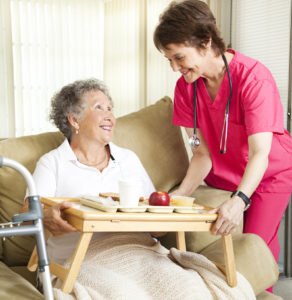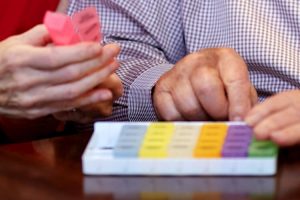
Posted: May 1, 2023
Leaving the hospital or care center and returning home after an injury or illness is a significant step in recovery. Whether you are the patient or the caregiver for a loved one, there are many considerations for ensuring a smooth transition that promotes recovery. Your healthcare team and any loved ones or family members who will help with your recovery should discuss your rehabilitation goals and review what you will need after the hospital rehab.
The following are some essential areas to keep in mind:
Let’s take a more in-depth look at each of these areas.
 When you or your loved one is well enough to leave the hospital, the healthcare team should discuss rehabilitation goals and organize referrals or other needed care. This can include potential psychological or emotional difficulties, as well as any required care and equipment.
When you or your loved one is well enough to leave the hospital, the healthcare team should discuss rehabilitation goals and organize referrals or other needed care. This can include potential psychological or emotional difficulties, as well as any required care and equipment.
You may have many questions during the first few days at home. This includes knowing if there are any symptoms you should be concerned about, such as fever, intense pain, or shortness of breath, and who to call if they happen. Ensure you have the phone number of the rehab centers’ social worker and any home care agency involved with your loved one’s care.
Find out if you or your loved one will require a cane, wheelchair, walker, special cushions, grab bars, or other assistive devices. If you need a hospital bed, shower chair, commode, oxygen supply, or other equipment, ask where to get these items. Can these be reused if you or your loved one already have this equipment at home?
Other questions include the following:
 Consider how to create a home space that is conducive to recovery. For example, you may need to move furniture around to create space for a hospital bed or other large equipment. Remove items that could create tripping hazards, such as area rugs and electrical cords. Figure out a safe place to store medications and an area to keep important information, such as a bulletin board or notebook.
Consider how to create a home space that is conducive to recovery. For example, you may need to move furniture around to create space for a hospital bed or other large equipment. Remove items that could create tripping hazards, such as area rugs and electrical cords. Figure out a safe place to store medications and an area to keep important information, such as a bulletin board or notebook.
If you are a caregiver, try to learn as much as possible while your loved one is still in hospital rehab by watching the physical and occupational therapy staff as they perform their tasks. Don’t be afraid to ask them to watch as you try to repeat what they’ve done. Let them know if you know you cannot perform specific tasks (such as wound care) or cannot help with personal hygiene (such as helping your family member take a shower or use the bathroom). Some caregivers are okay with changing a loved one’s briefs, while others feel uncomfortable doing this task. Think about your feelings as well as your loved one’s. The rehab team needs to know this information so they can plan for any needed help.
Ask the caregiving team if you or the patient should prioritize or avoid any foods. This might include specific foods, such as milk or meat, or general types of food, such as soft food or liquids. If your loved one needs special foods or beverages, stock up before discharge.
 Be sure you are clear on the types and dosages of medications, how long to take them, when to take them (such as with or without food), and whether there could be any side effects. Consider interactions with any over-the-counter medications, vitamins, and herbal supplements you or your loved one might be taking. Find out where you can get refills and whether insurance will cover the cost.
Be sure you are clear on the types and dosages of medications, how long to take them, when to take them (such as with or without food), and whether there could be any side effects. Consider interactions with any over-the-counter medications, vitamins, and herbal supplements you or your loved one might be taking. Find out where you can get refills and whether insurance will cover the cost.
Being a caregiver is a big job; you must care for yourself, not just your loved one. This means paying attention to your emotions as well as your physical health. It also means taking time for yourself—even briefly—each day. This is essential for all caregivers.
Rhythms Home Care can help patients transition back home after hospital rehab. Our team’s comprehensive approach takes input from clients and their families when creating a home care plan. Whether you need short-term or long-term care, or assistance with medical care, our compassionate team can offer you the support you need. We provide non-medical care such as personal hygiene and dressing, medication reminders, meal preparation, light housekeeping, and more. If you are in need of medical care, we offer medication management and administration, basic wound care and catheter care, plus much more.
Contact Rhythms Home Care today for more information about our services.